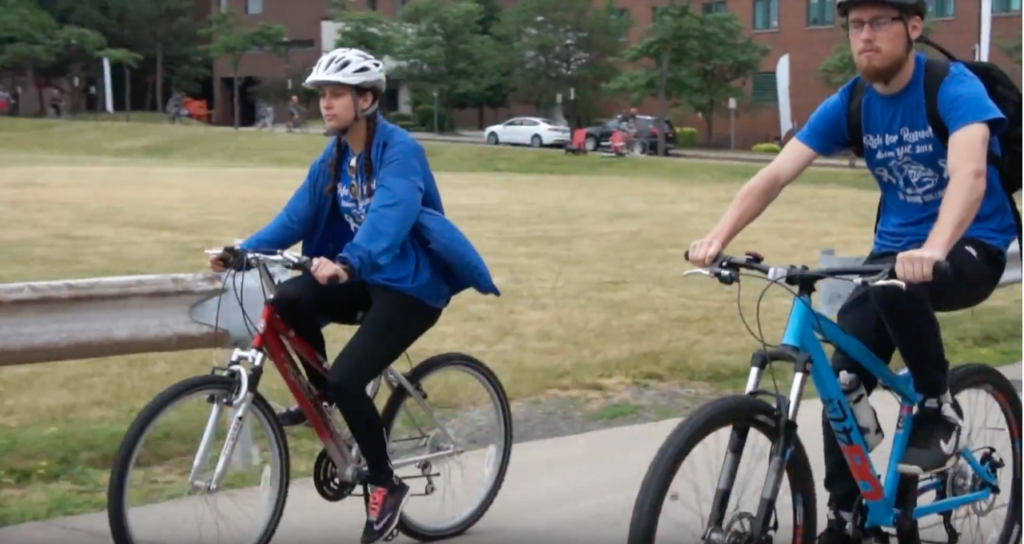Established in 2009, Aging is a medical journal focused on the publication of high-impact research in the fields of traditional gerontology and beyond. With an impact factor of 5.179, Aging is amongst the top-ranked medical journals in the category of age-related research, based on cites per document in Scopus.
The journal’s wide range of accepted manuscript topics allows the content to extend beyond the limits of standard age-related research like cellular senescence and the evolution of aging to accommodate studies on broadly linked topics such as cellular and molecular biology, pathology in model organisms, and cancer.
In addition to its commitment to publishing high quality research in these fields, Aging also supports major research through the sponsorship of conferences and fundraising events. This is why, in June 2018, Aging chose to sponsor a participant in the 23rd annual Ride for Roswell in Buffalo, New York, where the journal is headquartered.
About the Ride for Roswell
For more than two decades, the yearly Ride for Roswell cycling event has benefited research and patient care programs at Roswell Park Comprehensive Cancer Center in Buffalo. Beginning as a local event inspired by a young cancer patient named Katherine Gioia in 1996, the ride has since grown into one of the largest single-day charity cycling events in North America, attracting thousands of participants every year. Though the inaugural ride was established with three routes, the current version of the event features 11 routes to accommodate riders of all ages and skill levels.
The 11 routes are distinguished by both their degree of difficulty as well as the different scenery they feature—the routes follow creeks and rivers, country roads, city streets, and even cross over into Canada. The 18-mile downtown route (known as the “RosRoll”) winds through Buffalo, past historic landmarks, parks, and neighborhoods. Two routes of either 28 or 46 miles allow riders to pass from the U.S. into Canada over the Peace Bridge and return to the U.S. via the Rainbow Bridge at Niagara Falls. Several of the routes are classified as “recreational,” while others are recommended for serious cycling enthusiasts only. Altogether, the 11 routes comprise over 400 miles.
Each route requires riders to raise a minimum of $200 to participate, while the two Canada routes have a fundraising minimum of $500. All funds collected are allocated to the Roswell Park Alliance Foundation—the non-profit arm of the Roswell Park Comprehensive Cancer Center. Through the Ride for Roswell, participants have a direct impact on the lives of the 36,000 people who seek medical treatment at Roswell Park annually. The funds they raise directly finance life-saving cancer research and quality-of-life grants for patients.
Aging’s sponsored rider and the 2018 Ride for Roswell event
In support of the important research conducted by the Roswell Park Comprehensive Cancer Center, Aging chose to sponsor Ride for Roswell participant Sergei Kurenov. Mr. Kurenov works for Roswell Park as the director of surgical simulation in the department of surgical oncology. His work lies at the fascinating intersection of medicine and technology, with research interests including the development of surgical software using 3D reconstructed patient scans. This software allows surgeons to simulate different operating scenarios and therefore create better surgical intervention plans. Patients also benefit as surgeons can use the software to explain procedures more clearly.
Aging chose to sponsor Mr. Kurenov because his research—and all the vital research at Roswell Park—is central to what the journal stands for. Mr. Kurenov also shares a commitment to the free exchange of ideas and collaboration that Aging promotes as an open-access journal. The software he develops is open-source, which allows other scientists to build better programs and ultimately help more people.
“Like in software development, in cancer research, the open-access journals play a tremendous role in the fight against cancer, because they provide fast, reliable, and free scientific information,” Mr. Kurenov wrote on his fundraising web page.
Mr. Kurenov set a fundraising goal of $500 to ride the 46-Mile Canada Route—a path with an average ride time of between four and six hours. With the support of Aging, he exceeded his fundraising goal at $535 and joined more than 7,700 fellow riders and 2,000 volunteers on June 23, 2018 for the event.
After a bagpipe performance at the starting lines, the riders were off. The end of the race was marked with festivities at the University of Buffalo North Campus finish line to remember those who lost their lives to cancer and to celebrate survivors.
In spite of rainy conditions, this year’s Ride for Roswell was a major success thanks to the fundraising efforts of people like Mr. Kurenov and his fellow participants. In its 23-year history, the 2018 event marked the first time that riders had raised over $5 million in one race. The grand total amounted to $5.2 million. To date, this charitable cycling event has generated $48 million for cancer research and patient care.
How you can support scientific research
With 2018’s event now concluded, next year’s 24th annual Ride for Roswell is already scheduled for Saturday, June 22, 2019. While registration is not open yet, you can find useful information on routes, fundraising tools, and donation opportunities on the event’s website at www.rideforroswell.org.
Aging is proud to have supported this important initiative benefitting cancer research through the sponsorship of Mr. Kurenov. In addition to supporting fundraising for cancer research, the journal also actively supports the research community by sponsoring scientific conferences around the world. To learn more or to request sponsorship for your conference, visit the Aging website at www.aging-us.com/conference-request.

